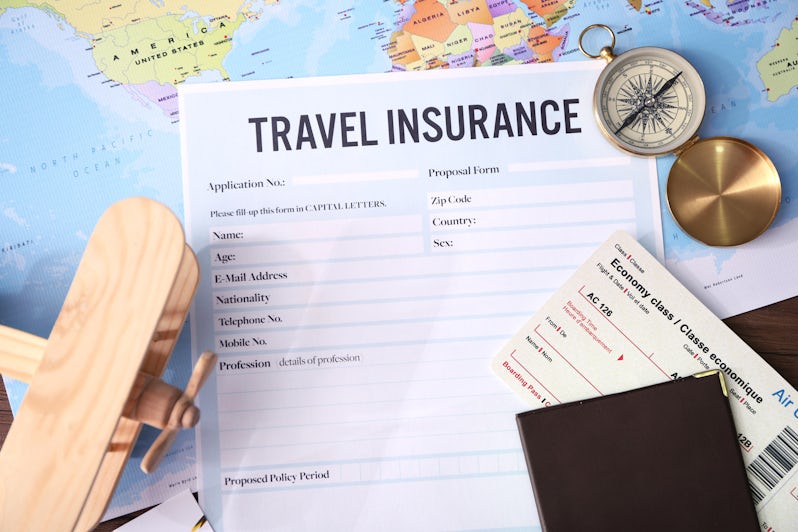
River Cruise Travel Insurance: What It Covers and Why You Need It


Sometimes we don't value something until we wish we had it. That can be especially true of river cruise travel insurance. In the back of your mind, you may have thought about buying it to cover your upcoming trip but didn't really understand the protection it offered so you passed it up.
Here's a look at what can put a snag in river cruises, which lines offer guarantees and when river cruise travel insurance will come to your rescue -- and when you may still be up the river without a paddle.
On This Page
River Cruise Pitfalls
There are a few things that can put a crimp in a river cruise itinerary. Many rivers, especially the ones in Europe, have plenty of bridges spanning them. When the river gets too high, it can be impossible for a riverboat to sail underneath with enough clearance. Likewise, if the water level is too low, it becomes impossible for some boats to continue without scraping the bottom and damaging the ship.
River cruise lines have several solutions in place for these circumstances. One of the most common involves disembarking passengers from the ship they booked and busing them to one its other ships further up or down the river. That's what's known as a "ship swap." Alternatively, the line might entail transferring passengers to hotels on land from the ship to continue the vacation as a coach tour. Another option is substituting a different river, such as the Rhine for the Danube. Sometimes conditions may be so bad that an itinerary is canceled altogether, but that is incredibly rare.

River Cruise Guarantees
Some travelers avoid river cruises during certain seasons because of the unpredictability of the weather and water levels. To combat this aversion, a pair of river cruise lines that share the same parent company -- Emerald Waterways and Scenic Luxury Cruises & Tours -- offer passengers a guarantee that protects their vacation investment.
You are enrolled in the cruise line's insurance coverage once you commence your voyage. There is no extra fee; it's already wrapped up in the cruise fare. Its goal is to protect you from things like weather, natural disasters, mechanical breakdowns or strikes that delay or cancel the voyage. It's also designed to handle atypical, unforeseen events that really put a stranglehold on your river cruise instead of just a minor delay or deviation. In those cases, Emerald and Scenic refund passengers in cash for the dashed itinerary and not the industry standard of a future cruise credit.
What is classified as an "unforeseen event"?
When a ship is unable to sail and the cruise line can't execute shore excursions except by way of bus rides of greater than three hours each way
A ship swap where the bus ride between vessels is more than six hours
When the line can accommodate passengers on another ship due to high/low water but your itinerary is delayed more than 24 hours
If the ship you booked breaks down and can't continue the itinerary and no alternative ships are available
If, due to an industrial action, the ship can't pass through a lock and the cruise cannot continue within 24 hours
That coverage sounds good, right? And it does offer peace of mind, but be aware that even with these guarantees, high water levels can still slow down an itinerary, ship swaps that take less than six hours to complete are fair game and the lines may embark/disembark you within 62 miles of your scheduled point of embarkation. And, just as with any cruise, there is no guarantee that you'll see a specific attraction listed in the itinerary if prevailing conditions make it impossible. The cruise lines will instead bring you to a comparable attraction elsewhere.
Why You Should Still Purchase Third-Party River Cruise Trip Insurance
You should buy your own third-party travel insurance policy -- even if you're sailing with Emerald or Scenic that provide some complimentary coverage through their river cruising guarantees. That's because you'll want a full complement of inclusions, such as lost luggage, flight cancellations, medical coverage/evacuations and more.
And, if you're not sailing with a line that has its own guarantee, you'll want river cruise travel insurance to help mitigate the fallout from a whole host of issues. During certain seasons, river cruises are at the mercy of river levels. High water levels, low water levels and other weather events can be problematic.
Here's what third-party insurance will cover -- and what it won't.

Will Travel Insurance Cover You…
... if water levels are high?
When cruising Europe's rivers in spring, you can encounter high water levels. This is totally dependent on conditions leading into the spring, such as the winter snowfall in the Alps, as well as current weather patterns. It's tough to predict which river will have an issue and when, but early spring is when it traditionally can happen. Why the water level is high can factor into how an insurance company handles your claim. For example, Christine Buggy, vice president of marketing for Travelex Insurance Services, says, "In the event of a delay or cancellation due to unforeseen inclement weather, you may cancel your trip and receive a refund up to the maximum amount listed on the schedule of benefits." But, she goes on to say, "If the supplier cancels the trip due to high water levels as a result of torrential rain, coverage would apply under inclement weather."
... if water levels are low?
Interestingly enough, the weather clause at Travelex and other insurance providers doesn't apply to a low water level situation that disrupts a river cruise. This can happen at the height of summer, usually August but occasionally going into fall, on Europe's rivers. While you could make the case that, of course, weather has something to do with low water levels in a river, there is no specific "event" (like torrential rain in the case of a high water situation) that directly caused the low water level. So, if your river cruise is delayed or changed because of low water, third-party insurance probably won't help you unless you purchased a "cancel for any reason" policy.
... if fog or wind disrupts the voyage?
Insurance clauses dealing with weather, trip delay and cancellation are your friends in the case of fog or wind. When these circumstances stop your itinerary from continuing for a certain length of time, you can make a claim with your insurance provider for compensation for the unused portion of the trip.
... if your ship is going to be swapped out?
The act of swapping out a ship on an itinerary won't necessarily trigger a clause in your insurance policy, though it might. For example, if the cruise line is swapping out one ship for another comparable vessel and you'll receive the exact experience you booked, there is no claim to be made. However, if the ship suffers a mechanical failure and no comparable vessel is available on which you can continue the voyage, that would be an incident for which you can make a claim.
... if your itinerary changes?
Generally speaking, trip insurance doesn't cover minor, on-the-fly changes to cruise itineraries. Cruise lines will make every effort to deliver the experience you booked but when it can't, due to inclement weather or other issues, the line will present a comparable alternative or offer some type of compensation. However, Buggy says you may be able to make a claim under your policy's cancellation/interruption clause due to a covered reason that could include "inclement weather, the mechanical failure of the common carrier resulting in a loss of 50 percent or more of your trip or the financial default of the cruise company."
Travelex's Buggy offers this bit of parting advice: "Prior to purchasing a travel insurance plan, review the policy and/or contact the travel insurance provider to inquire about plan benefits, exclusions and limitations to fully understand what is included in the coverage." This is so important since terms for different policies vary widely.
For example, when responding to a claim, some insurance providers will only offer a voucher for a future trip rather than a cash payment. Also bear in mind that some insurers offer policies with a "cancel for any reason" clause. It may add a few dollars to the package and only pay out a certain percentage of your expenditure (between 75 percent and 100 percent of the trip cost), but it can give you peace of mind so you're the one that decides if you'll take a chance with a high or low water level on your next river cruise.